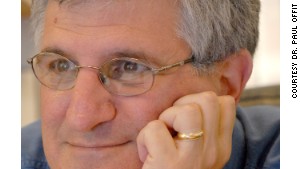身為兒科醫生和輪狀病毒疫苗發明者之一的 Dr.Paul Offit 撰文:
Opinion: Alternative healing or quackery?
By Dr. Paul Offit, Special to CNN
Editor's note: Dr. Paul Offit is chief of the division of infectious diseases at the Children's Hospital of Philadelphia and author of the book "Do You Believe in Magic? The Sense and Nonsense of Alternative Medicine." He previously has taken on the anti-vaccine movement.
It used to be called "fringe" or "unconventional" medicine -- or simply quackery. Today, it's called "alternative," "complementary," "holistic" or "integrative."
他也提到喬布斯,說"他本來有95%機會活下去,但卻選擇了針灸,草藥,洗腸,結果死了"。
Steve Jobs, for example, suffered from a neuroendocrine tumor of the pancreas. With early surgery, Jobs had a 95% chance of recovery. But Jobs chose acupuncture, herbal remedies, and bowel cleansings instead, and died as a consequence.
全文如下:
MayoClinic的文章:
MayoClinic: Complementary and alternative medicine: Evaluate treatment claims
USA Today關於替代療法的相關報道:
Book raises alarms about alternative medicine (也提到Dr.Offit的評論)
How to guard against a quack (如何提防醫騙)
如何提防醫騙?
1,他們自稱有秘方(• They claim to have cures no one else knows about.);
2,他們自稱被打壓(• They claim that others are trying to suppress their discoveries.);
3,他們收現金(• They want cash upfront.)
4,這種治療隻在美國境外才有,比如在墨西哥的提華納。(• The treatment is only available outside the USA, such as in Tijuana, Mexico.)
5,他們自稱驚人療效(• They make amazing claims.);
6,他們依賴於證人證詞(• They rely on testimonials.)。
Personal stories can be extremely misleading, says Gorski, managing editor at the blog Science-Based Medicine.